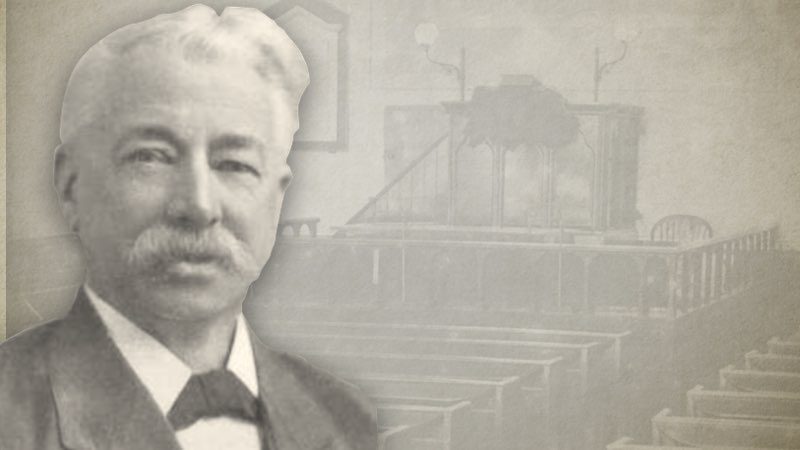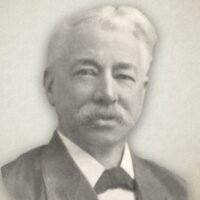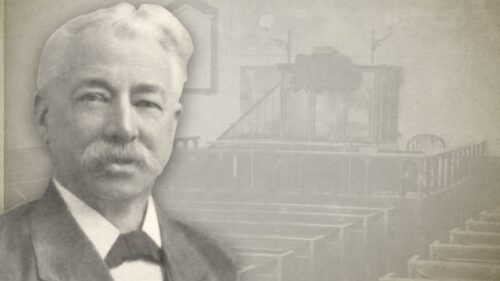
The “Almost” Christian
A Sermon Preached By John Booth At Providence Chapel, Croydon, On Sunday Evening, November 29th, 1903.
The charge preferred against Paul was, as we read in Acts 21:28: “This is the man that teacheth all men everywhere against the people, and the law, and this place (i.e., the Temple): and further brought Greeks also into the Temple, and hath polluted this holy place.” So they said he taught against the law, against the Temple, and against the rules of the Temple. It is certain that Paul taught everywhere the received fulfilment of all these things, that Christ was the Substance of them. Paul had been a Pharisee; he had belonged to that straitest sect until he was called by grace, and shown by God Himself that all this natural religion was but an empty bubble. He had turned from every regulation of the Temple because the test of all these things was the fulfilment of them. He then preached Jesus Christ, and testified of His life, death and resurrection.
In defending himself from the charges made against him, Paul first spoke on the stairs of the castle at Jerusalem. Secondly, he was taken before Felix, and as he reasoned before him of righteousness, temperance and judgment to come, Felix trembled and said, “Go thy way for this time; when I have a convenient season I will cal] for thee.” Thirdly, when Paul appealed to Caesar he was brought before Festus and king Agrippa, as we read in this chapter. It was Agrippa who said, “Almost thou persuadest me to be a Christian.”
We have here three representative men: 1. Festus the Roman; 2. Paul the Christian; and 3. Agrippa the Jew. We might almost divide all the race into these three classes. Though I know in the Bible God divides men into two classes—sheep and goats, chaff and wheat, the godly and the ungodly, the righteous and the unrighteous. Christianity, in the person of Paul the Apostle, stands to be judged by Festus and Agrippa. One has a worldly intellect; the second was brought up under the traditions of the covenant people, the Jews; while Paul stands to define Christianity.
I have noticed that wherever Paul spoke he testified of Jesus. Jesus was his theme; Jesus was his foundation; Jesus was his righteousness. He shewed clearly that Christ had gone right to the end of the law for righteousness. And when I read that I feel there is not the least bit for me to do. If Christ had not gone completely to the end of the law, all men would have been entirely lost.
In this chapter Paul tells us how he had lived a Pharisee, and how God had called him by grace. It is well for us to go back sometimes to the time when God opened our eyes. Sometimes we cannot look in advance, but we can look back. We are told to remember “the rock whence we were hewn, and the hole of the pit whence we were digged;” and when we forget this, we are perilously near being Pharisees.
It was an experimental sermon that Paul preached to these men. He told them of One who had been crucified, and had risen from the dead, and had ascended on high. When he heard of the resurrection, Festus said, “Paul, thou art beside thyself; much learning doth make thee mad.” Festus was a typical character. You go to a worldly man, tell him how God stopped you in your downward course, tell him that you believe that every word of the Bible is true; he will tell you that you are a fanatic, that the Word of God is a book of exploded theories; that there is no hell and no judgment.
Paul was a changed man; he had seen a vision, and it had changed him. This kind of religion the worldly man does not believe in now; he will say, “So much Bible reading, so much chapel-going, will make you mad.”
Leaving this part of the subject, we now come to another man; one of a different type, but just as worldly. The earnest belief of Paul comes into contact with scepticism on the one hand, and a dead, inoperative faith on the other. So you have on the one hand worldly scepticism to contend with, and on the other a dead faith, and there is no comfort in that; or if there is, it is a false comfort. Jeremiah tells us of some prophets who said, “Peace, peace, when there is no peace.” I want neither scepticism on the one hand, nor a dead, inoperative faith on the other. There is much profession in our day, profession of holding a belief in Christ, but it only springs out of a natural heart. I want to be charitable, but I have no universal charity.
Here we have another typical character. This man was brought up with those who did believe in supernatural things, he was versed in the Jewish rites and ceremonies of the Old Testament. While these were incredible things to a worldly man, this man could not ridicule what he believed in. Seeing the man perplexed, Paul, as it were, followed up the advantage and said, “King Agrippa, believest thou the prophets? I know that thou believest.” Arid Agrippa said, “Almost thou persuadest me to be a Christian.”
Friends, we must have a better faith than this. “Almost,” seems as though Agrippa was mid-way between Festus the Roman and Paul the Christian. It seems that this king had too much knowledge to go over to the Roman, and too much worldliness to go over to Paul. So it is now. There are some who have recollections of early religious teaching, and cannot go over to the scorner; in judgment they believe what they have been taught, but their hearts are not changed.
This is a strange expression: “Almost thou persuadest me to be a Christian;” it is a strange text. We will nor stand tonight on intermediate ground; we will decide on one or the other. Erskine says:
“To good and evil equal bent,
I’m both a sinner and a saint.”
You cannot touch the hem of Christ’s garment, as the woman did, and not be a Christian. Well might we ask. “What is it to be a Christian?” Hart says in his searching hymn (Gadsby’s, 237):—
“Let us ask the important question,
(Brethren, be not too secure),
What it is to be a Christian?
How we may our hearts assure?
Vain is all our best devotion,
If on false foundation built;
True religion’s more than notion,
Something must be known and felt.
‘Tis to trust our Well-beloved,
In His blood has washed us clean;
‘Tis to hope our guilt’s removed,
Though we feel it rise within.
Tis to feel the fight against us,
Yet the victory hope to gain;
To believe that Christ has cleansed us,
Though the leprosy remain.”
This seems almost like a contradiction of terms, and a Christian is a paradox. We read that the disciples w«re first called Christians at Antioch; previous to that they were called disciples. Before that they were called brethren, and that is a good name; it means the children of one Father. If you are brethren, then “see that ye fall not out by the way.” By being the children of one Father we shew that we are brethren and sisters in Christ. We are called Christians after Christ, which name means “the anointed.” If we are Christians we are anointed too. If we have the Holy Spirit we are Christians. If we are born again we are Christians; not half-way Christians, that is impossible; we have the seed of grace, “Being born again, not of corruptible seed, but of incorruptible, by the word of God, which liveth and abideth for ever.”
Have we any proof that we are Christians? We read in John 17, in the prayer of Christ, “This is life eternal (and that is Christianity), that they might know Thee the only true God, and Jesus Christ, whom Thou hast sent.” All short of this is show; all short of this is vanity.
See how God dealt with Manasseh. He was a wicked man, and had committed great sins in Jerusalem. Because he was an elect vessel, God brought an army against him, which took him among the thorns and bound him with fetters, and then he began to cry to the Lord. (Have you ever been caught in the thorns of affliction and cried to God?) “And God heard his supplication, and brought him again to Jerusalem. . . . Then Manasseh knew that the Lord He was God.” That was how he was brought to be a Christian.
Grace may be hidden from others for a time—it often is—but as sure as God has put His fear in our hearts it shall be kept alive, “Being confident of this very tiling, that He which hath begun a good work in you will perform it until the day of Jesus Christ.” In Adam we were created in holiness, but we fell, and now we are not able to think one right thought of ourselves. At regeneration God put His incorruptible seed in our hearts, Christ was born in us. We must not rest satisfied with the fact that Christ was born in Bethlehem’, though it is a wonderful fact; He must be born in our hearts.
Then Christianity is not almost Christianity. To be almost a Christian is not to be one at all. In Scripture we see some characters who appeared at first as if they were Christians. We cannot find a man who spoke more truthfully than Balaam, yet he was a false prophet. We cannot find a man who had more zeal than Jehu, but he was afterwards an idolater. We read that Herod heard
John the Baptist gladly and did many things, but he was a wicked man. You may see people who seem like Chris- tians, yet there is a gulf between them and the people of God. That which is flesh remains flesh, and cannot be made into spirit; the flesh with all its refinement remains flesh, and it needs the power of God to effect a change.
We see in the Bible that natural people may weep. Esau wept bitterly; if we had seen him, we should have thought he must have been a Christian. And we might have stood by Peter, and heard his blasphemy, and thought he could not be a child lof God; but he was one. We read of some who were “ever learning,” but never came to a knowledge of the truth. I think sometimes, friends, that these things are left on record for our instruction.
In the Gospel of Mark we read of a man to whom Christ said, “Thou art not far from the kingdom of God;” land I take it that the Words were favourable to the man. The Scripture comes down very low. He that has only a little grace is a Christian. He that has only a spiritual desire, that man is as much a Christian as he who can stand up and pray fluently before others. Sometimes we see, if we read in the Bible, that grace is at a low ebb. Have you ever read in that beautiful prayer of Nehemiah’s, where he says: “Let now Thine ear be attentive to the prayer of Thy servant, and to the prayer of Thy servants, Who desire to fear Thy Name”?
Again, we read of a youth (the son of Jeroboam), in whose heart was found “some good thing towards the Lord God of Israel.” It was but a little thing, but it was real; and in religion everything depends upon the reality. A person thus brought to recline on God, to fall on Him, feeling, “If I perish, I perish,” that is a Christian.
“Almost thou persuadest me to be a Christian.” It is strange that people should found a creed on such a text as this. Many people have a sort of feeling; but it is only natural, not spiritual. You know God’s Word allows us to deal with people’s hearts and consciences. Some of you dare not be scorners with Festus; you feel you know these things are true, you cannot scorn them. May God give us more than nature, and by faith enable us to say, “This God is my God, this Christ is my Christ,” and He shall have all the glory. Amen.
John Booth (1861-1928) was a Strict and Particular Baptist preacher. He was appointed the Pastor of Zoar Particular Baptist Chapel, Bradford, a position he served for thirty years. Walter Brooke wrote of him:
“With mingled feelings of pleasure and sorrow I accede to the request to write a short Foreword to the memoir of the life of my late beloved and esteemed friend. His removal is a great personal loss to me, having walked in loving friendship with him for about thirty years. Un- broken fellowship is a choice and rare privilege in these days when misunderstanding too often sadly mars our communion. In dear John Booth one possessed a friend to whom the heart could be opened freely. And if one was compelled to differ in judgment, which in this present imperfect state is well-nigh inevitable at times, there was no fear of communion being in any degree interrupted. His mind was large enough to admit that the freedom he claimed for himself should be accorded to others. Many interesting, entertaining and profitable hours did we spend together in friendly argument and discussion. Of him as a preacher one needs not to say much, as his praise is in the churches. But having had the privilege of hearing him on several occasions, perhaps a little personal testimony may be seasonable. His style was very clear and concise; his remarks very direct and pointed. This was the result of much prayerful thought and careful study. Our friend was no loiterer in the Lord's vineyard. Here is a specimen of his terse and suggestive mode of teaching: I was listening to my esteemed friend on a special occasion, and as he read his lesson, on reaching the words, " Thy kingdom come, Thy will be done," he paused, and in a most forceful manner remarked, Do you know what that means ? That means, Crucify me.” What a volume of meaning appeared to me in these few words! His simplicity of purpose, and the fearless expression of his deep convictions, were marked features of his preaching. There was no mistaking his meaning. John Booth believed and acted upon the words of his Lord and Master, " And call no man your father upon the earth, for One is your Father which is in heaven; neither be ye called masters, for One is your Master, even Christ." He sought his message from his Lord, and delivered it " not with enticing words of man's wisdom," but that "which the Holy Ghost teacheth, comparing spiritual things with spiritual." His labours were indeed abundant. His heart was in his loved work, and he always aimed to give his hearers of his very best. During my long, painful affliction his tender sympathy was marked, and he believed the time would come when I should again testify of the grace and love of the Lord Jesus. And it is my great comfort that he was spared to know that his convictions were true. In September of last year we met in Sussex, and I then heard him preach, from Rev. 19:6: "And I heard as it were the voice of a great multitude, and as the voice of many waters, and as the voice of mighty thunderings, saying, Alleluia: for the Lord God omnipotent reigneth." How we rejoiced together! On hearing of his lamented end, my heart was gladdened amid the sorrow in reflecting that his ransomed soul had joined the heavenly host in singing " Alleluia!” May those who have taken in hand the production of this volume be cheered and encouraged by a quick and extensive sale. And may we who are left for a while to labour on, remember the word of exhortation: "Whose faith follow, considering the end of their conversation, Jesus Christ, the same yesterday, and to-day, and forever."
John Booth Sermons




